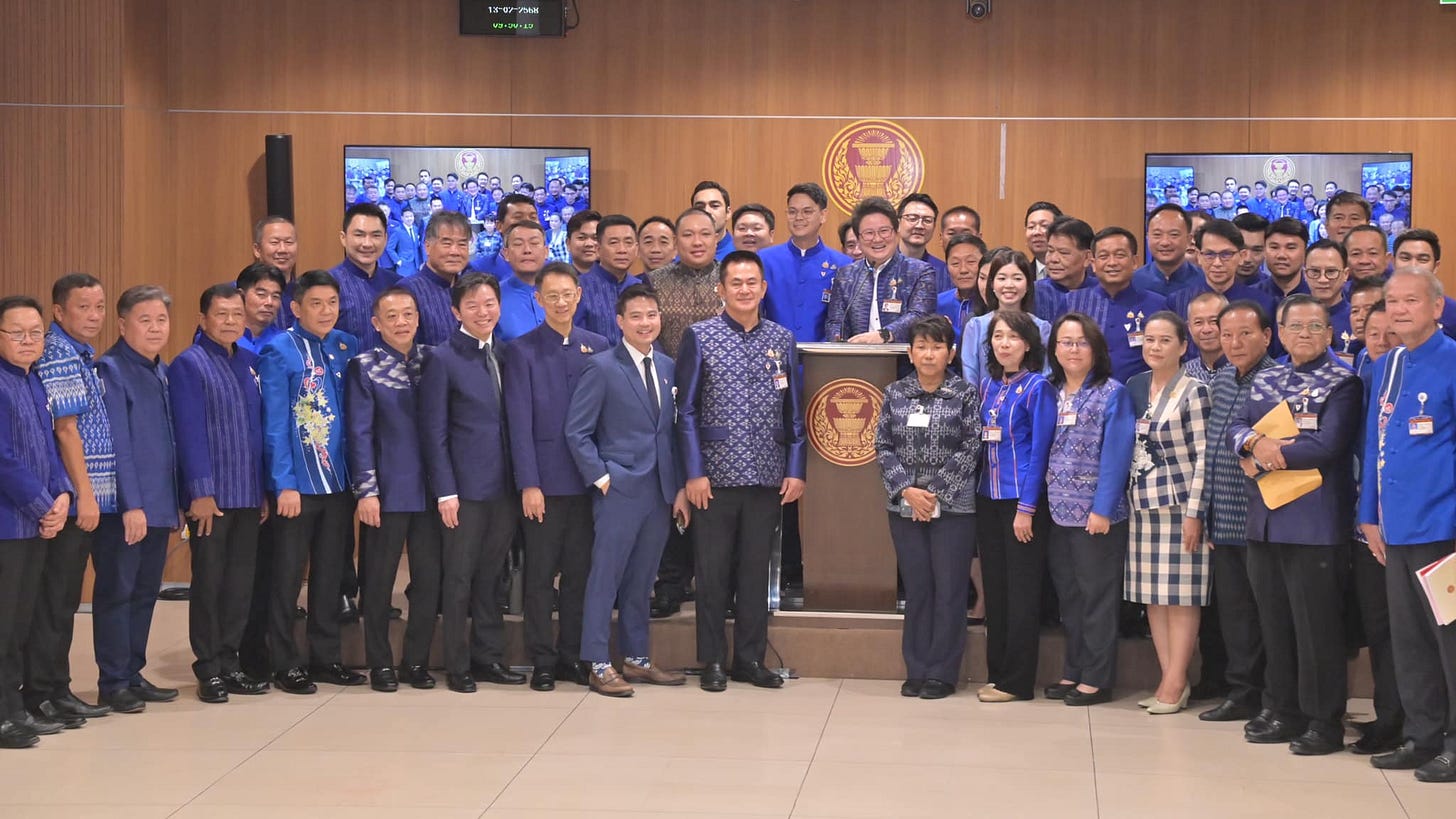Dark Blue Power
Bhumjaithai wields its strength to protect the constitutional status quo

Last year’s byzantine Senate elections had represented a triumph for the Bhumjaithai party, as with as many as over half the newly elected Senators having apparent affiliations with the Bhumjaithai Party. (Some even speculate this number to be closer to 150-170 out of 200 upper house members). The Standard provided three examples of upper house members with a “dark blue” (the color of Bhumjaithai) hue: those with links to Bhumjaithai leader Anutin Charnvirakul, former Bhumjaithai candidates for the lower house, and those with ties to the Buriram political machine that Bhumjaithai counts as its local capital. But last year, the implications of having a dark blue senate was not yet clear. As I wrote for 9DashLine in July last year:
If it is true that the new Senate is now “dark blue”, what does that mean for Thailand’s political landscape? This is a difficult question to answer because the Bhumjaithai Party has not always been ideologically consistent. It is steadfastly royalist and conservative — ensuring that constitutional amendments too threatening to conservative interests are unlikely to pass — but in other areas, the party’s image has often been ambiguous. It was founded as an offshoot of Thaksin Shinawatra’s Thai Rak Thai Party but joined both the anti-Thaksin Abhisit Vejjajiva and Prayut Chan-o-cha coalitions. It is linked to a local godfather, Newin Chidchob, who holds sway over Buriram province, and is known for its mastery of local politics via allied political clans. At the national level, the party is best known for its support for legalising medical marijuana. This is not a profile that necessarily points to a clear picture of how its senators will seek to use their power.
What is clear at this stage is that the new Senate is unlikely to be as predictable as its predecessor. Its key dark blue faction may prove to be friendly or hostile to the Pheu Thai-led government depending on the circumstances. At the very least, it is likely to provide Bhumjaithai with greater bargaining power as it negotiates with Pheu Thai and other coalition partners on its policy priorities.
Over half a year later, what the dark blue Senate means has become much clearer to see. There was no clearer example than the events this past Thursday, when a parliamentary debate on constitutional revision was halted due a lack of quorum. Anutin, citing Bhumjaithai’s belief that the motion under discussion contradicted a previous Constitutional Court ruling, argued that his party “could not carry such risk”; given that this was not a matter reached by coalition consensus, his party was free to reject proceeding with the debate. The Bhumjaithai MPs walked out of the session. They were followed by the dark blue group of Senators, forcing the proceedings to be halted as quorum was lost.
This was not the first time that the Senate and Bhumjaithai have wielded their influence over the process of constitutional amendment. Last year, while debating whether or not a constitutional amendment referendum would require a “double majority” for amendment to pass (at least fifty percent of eligible voters must vote, and at least fifty percent of those who turn out must vote in favor), the House of Representatives as a whole voted to scrap this requirement while Bhumjaithai sent a strong signal of disagreement by abstaining. But the Senate then voted to keep the double majority rule, forcing a committee to be set up to reconcile the two houses. The Senate’s preference eventually prevailed.
Although these were some of the most dramatic examples of how Bhumjaithai have worked in tandem with the dark blue Senate to exert power, the subtle influence of the party’s sway over the upper house can be felt elsewhere. After all, not long after the Senate elections, Pheu Thai’s original plans to more strictly regulate marijuana use fell by the wayside, probably in recognition of the fact that Bhumjaithai’s bargaining power has increased significantly. And even without using the Senate, Bhumjaithai has acted to block other initiatives, including the possibility of amending ethics standards as part of constitutional reform.
All of these episodes demonstrate that Bhumjaithai is willing when necessary to act as an internal opposition party within the coalition government. Late last year, the media had given Anutin the moniker "Bhumjaikhwang” — proud to block, a play on the party name. For his part, Anutin has said that he was not motivated by scuttling anybody and was only “proud to do what is in the national interest.”
At the very least, — marijuana being the prime example — they have shown that they are willing to act aggressively to prevent anything that would cause the party electoral harm. And more importantly, Bhumjaithai has done enough blocking to ensure that the possibility of constitutional reform has now become very remote, virtually guaranteeing that Thailand’s institutional status quo will be preserved for the foreseeable future.

